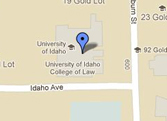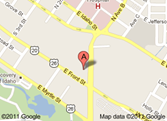College of Law
Moscow

uilaw@uidaho.edu
Administration Office: 208-885-2255
Dean’s Office: 208-885-4977
fax: 208-885-5709
Menard 101
711 S. Rayburn Drive
Mailing Address:
College of Law
University of Idaho
875 Perimeter Drive MS 2321
Moscow, ID 83844-2321
Boise
First Monday - April 7, 2008
In this issue:
- "Second Century" Update: Two-Location Concept Submitted to Board of Regents
- Bellwood Program to Highlight Issues of Constitutional Law
- Student Organizations Shine in Public Service and Co-Curricular Activities
"Second Century" Update: Two-Location Concept Submitted to Board of Regents
University of Idaho Asks Board of Regents to Approve Concept of Statewide Law School with Two Places of Opportunity. The University has submitted to the Board of Regents (State Board of Education) a proposal to provide legal education at Moscow and Boise as the College of Law prepares to enter its second century. The Board will consider the two-location concept during its meeting on April 17-18 in Moscow. If the Board approves the concept, an implementation plan, including a business plan, will follow. The concept document, to be posted on the College of Law website when the Board publishes its agenda and meeting materials on April 10, makes the following main points:
- The University of Idaho is charged with a statewide mission in legal education carried out by the College of Law, which will mark its centennial in 2009.
- Idaho’s population has doubled since the law school’s enrollment capacity was determined, and the building on the Moscow campus was constructed, in 1972-73. Boise has since grown into a greater metropolitan center of population (over 600,000), commerce, and government.
- Idaho has a growing need for legal expertise to support economic development, administration of criminal and civil justice, and services needed by Idaho families. At the same time, legal education is changing due to globalization, specialization, rising demand for practice-ready graduates, and increased use of law degrees in business and other occupations.
- Affordable public legal education enables graduates to take jobs in Idaho communities or in the public sector; it keeps legal services and justice accessible for people of ordinary means.
- Recognizing these needs, the College of Law has conducted an open and thorough strategic planning process, engaging the law school community (faculty, staff, students), expert consultants, University leaders, distinguished alumni on the Law Advisory Council, the Idaho State Bar (co-sponsor of a conclave on Idaho legal education), district bar associations around the state, and Idaho’s judiciary. The State Board received a strategic planning progress report in 2007, and there have been consultations with individual members.
- The process has revealed that maintaining the status quo is not an option for the future; it would inadequately serve the state’s needs and the University’s mission. A wide range of alternatives has been examined from academic, legal, and policy perspectives.
- Surveys show that the College of Law would be more attractive to students if it were located in Boise as well as Moscow. Faculty scholarship and outreach also would be enhanced.
- The strategic planning academic consultant has strongly recommended a single statewide law school with efficient, unified administration and curricular design, providing two places of opportunity: Moscow and Boise. The Law Advisory Council unanimously has made the same recommendation. The concept has been adopted by the law faculty and endorsed by the University leadership, subject to State Board approval.
- The two-location law school would deliver the basic J.D. program at both locations and would feature distinctive specialties at each location. See the summary of features below.
- In Boise, collaboration with the Idaho Supreme Court on a multi-purpose physical facility – the “Idaho Law Learning Center” -- offers a once-in-a-generation opportunity. Upgrades of the facility in Moscow will keep it vital and attractive as well. The Legislature has appropriated funds for planning the Idaho Law Learning Center facility.
- Upon State Board approval of the two-location concept, the Boise location would be developed as soon as possible. Operations in Boise would begin as early as fall 2009 with either a full third-year program followed by establishment of years one and two, or a first-year program followed by years two and three. The sequence will be based on academic quality, depth of the qualified student applicant pool, accreditation standards, and costs and revenues analyzed in a business plan.
Features of the Two-Location Concept
Moscow
- Small (“quality over quantity”) residential law program; intimate teaching and learning environment for approximately 250 students
- Interdisciplinary connections to land grant research university in law, public policy, and science
- Emphases in natural resources and environmental law, American Indian law, and public lands
- Principal administrative offices of the College of Law, and service to academic community, continued on the University’s main campus
Boise
- Small (reinforcing “quality over quantity”) metropolitan program with variable-time curriculum for an eventual population of approximately 250 students
- Emphases in intellectual property and business law, including international business transactions and trade
- State law-related research and service to judiciary, legislature, and city/state/federal agencies
- Enhanced access to readily available, high-quality affiliate faculty
Dynamic Connections at Both Locations
- Delivery of core Juris Doctor degree education, including clinical programs, advocacy, and dispute resolution, with curricular progressions and capstone experiences
- Emphasis on development of professional identity, skills, values, and a sense of public calling, concurrent with generating intellectual growth and a fund of knowledge, as recommended in 2007 by the Carnegie Report and Clinical Legal Education Association “Best Practices” Report
- Differentiated and complementary upper-division offerings under integrated statewide curricular plan
- Linkages of people and places through distance education and related technologies
- Outreach to the legal profession and judiciary, and to communities in Idaho and beyond
- Unique and innovative approach to legal education – transcending distance and unifying Idaho
Readers are invited to examine the full concept document when it appears on the College website. Further information may be obtained from Dean Burnett (dburnett@uidaho.edu).
Bellwood Program to Highlight Issues of Constitutional Law
As noted in the last issue of “First Monday,” the 2007-08 Sherman J. Bellwood Memorial Lecture and related activities will take place in Moscow on April 21. At 9:30 a.m., in the College of Law Courtroom, the Bellwood Lecturer, Dean Kenneth W. Starr, will participate in a panel discussion on “The American Constitution and the Enduring Legacy of Justice Holmes.” Dean Starr will begin by drawing from Justice Holmes' now-famous Lochner dissent and focus upon the evolution of the law (including the interplay between the political branches and the judiciary) Other panelists will include Dean Burnett; Professor Don Crowley, Chair of the University of Idaho Political Science Department; and Professor Sheri Engelken of Gonzaga Law School.
At 4:00 p.m., in the University Administration Building Auditorium, Dean Starr will deliver the Bellwood Lecture, entitled "The Enduring Constitutional Conversation: Mr. Hamilton and Mr. Jefferson." Dean Starr will analyze and discuss the enduring tension between Alexander Hamilton's nationalist perspective and Thomas Jefferson's pro-state, localist perspective of American government and the Constitution. Dean Starr will follow the "enduring" conversation (over 200 years) from its beginnings to the current Justices on the Roberts Court.
Biographical information about Dean Starr can be found on the College of Law website. Further information about the Bellwood program is available from Professor and Associate Dean Richard Seamon (richard@uidaho.edu).
Student Organizations Shine in Public Service and Co-Curricular Activities
The College of Law is proud of the unselfish pro bono work, and of the curricular enrichments, provided by students during the 2007-08 academic year. The organizations contribute to the College’s civil sense of community and its openness to varied perspectives. The following list is illustrative:
- The Public Interest Law Group organized the 2008 “Alternative Spring Break” in March, with approximately 30 students providing pro bono services under professional supervision at Katrina devastation sites in the Gulf Coast, at the National Veterans Legal Services Program in Washington, D.C., at the Spokane Justice Center, and at Idaho Volunteer Lawyer and Idaho Legal Aid offices in Boise. The students raised money for their travel expenses, with additional assistance furnished by the offices of University President Tim White and the Dean of the College of Law. The student group also has organized a high school education outreach program and a Tenants’ Rights Workshop to help Moscow area renters understand the law in landlord-tenant disputes.
- In the Volunteer Income Tax Assistance (VITA) group, a record number of students have earned Internal Revenue Service certifications this year and are assisting members of the Moscow community as well as members of the Coeur d'Alene tribe at tax clinics in Moscow and Plummer. The group also sponsored its own “Alternative Spring Break” project, sending students to Alaska where they assisted native peoples in remote villages as part of a program sponsored by the Alaska Business Development Center.
- The Multicultural Law Caucus, committed to enhancing diversity and promoting a legal system that better reflects the many ethnicities of communities in which students one day will serve, is co-sponsoring this spring a panel program on religious diversity in cooperation with the J. Reuben Clark Law Society. The program featured practicing attorneys of many faiths, discussing the influence of faith in their professional lives.
- In addition, the J. Reuben Clark Law Society heard from retired Justice Sandra Day O’ Connor at an annual telecast program. Justice O’Connor spoke about the importance of preparation before being faced with tough ethical decisions. The organization also hosted Denise Farnsworth, counsel for Microsoft, who spoke on the topic “How attorneys can be a powerful force for change.”
- The Intellectual Property Club will hold its second annual Knowledge Bowl in April. The club is also laying a foundation for a panel discussion in the fall regarding the recording industry and the University's compliance with requests to prosecute IP piracy on campus.
- The Christian Legal Society is conducting two events of note this spring. First, it is sponsoring a series of Monday Bible studies and discussion, and second, it has recently completed a food drive, with all proceeds delivered to the town of Sonyota, Mexico.
- This spring the Board of Student Advocates (BSA) has sent moot court teams to the Duberstein Bankruptcy Competition in New York, a Trial Team to the American Association for Justice National Student Trial Advocacy Competition, and a team to the Jerome Prince Memorial Evidence Competition in New York. The BSA raises money for these moot court teams, supplemented by the Dean’s Office.
- The International Law Students Association (ILSA) and the Environmental Law Society (ELS) hosted two lectures by International Environmental Law speaker Professor Jim Salzman from Duke University. Professor Salzman spoke on the international laws governing whaling and on "Creating Markets for Ecosystem Services.” ILSA is also co-sponsoring a presentation by College of Law alumna Denise Baird of Hewlett-Packard. Ms. Baird will be discussing her experiences as corporate counsel.
- The Student Bar Association helped plan and conduct the first annual Graduation Banquet this spring, recognizing the outstanding accomplishments of students in the graduating Class of 2008. The SBA also sponsored the traditional Barrister’s Ball, and is undertaking a “Bowling Bonanza” to raise money for the College of Law student emergency medical fund.
Further information about all of the College’s organizations can be obtained on the website and from Anna Faller, President of the Student Bar Association.


